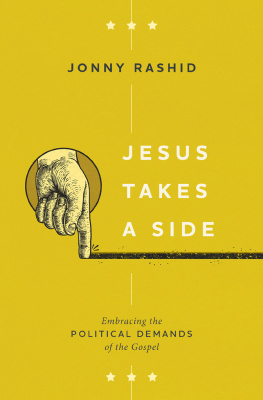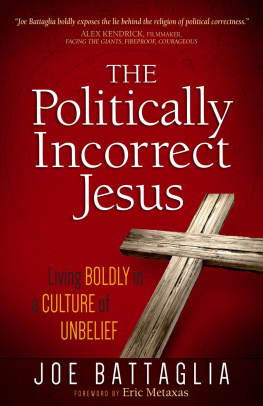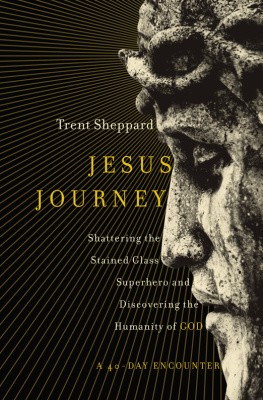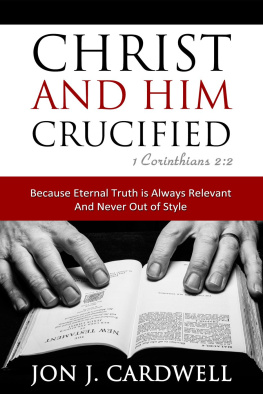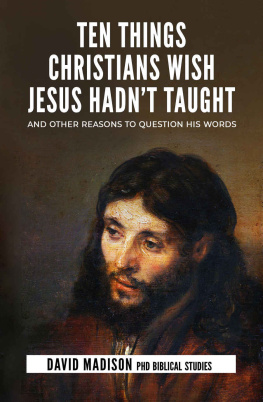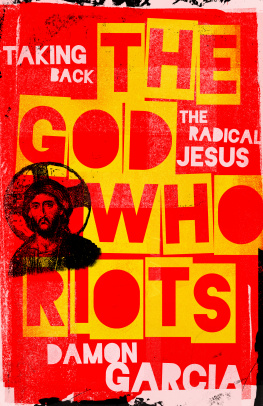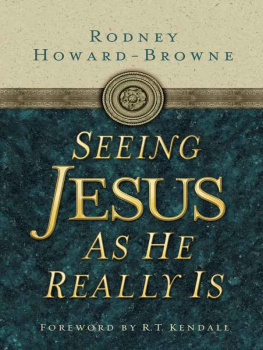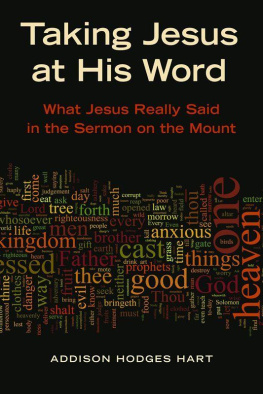Contents

Acknowledgments
I have so many people to thank for this book. What an experience and joy it has been to embark on this journey. Thank you to Herald Press and the stellar team there: to Laura Leonard for finding me and believing in me, to Aly Bennett Smith for helping promote the book and being a great Twitter mutual, and to Amy Gingerich for supporting me throughout the process. Yall rock, and Im so grateful for you.
Thanks to Kristen Rashid, my dear wife, who talked me through the process, helped me write a great proposal, and edited each chapter before I submitted them. She put in hours of work, and I am eternally grateful. And to Elaine and Agatha, my two sweet daughters, who learned what it was like to relate to a dad who was typing away on Saturday mornings. Thanks for your love and patience, girls.
Thanks to Circle of Hope and their leaders, who affirmed me in this work and supported me throughout this project. Tricia Fussaro was a tremendous gift to me during the writing process, while she was also doing incredibly heavy lifting for the church. I owe you a debt. Andrea McIntosh was a special support to me, and like a sister; as a third-culture kid, we shared in so much camaraderie. Hana Lehmann, Matthew Abraham, Robert Buck, Corinne Bergmann, Jimmy Weitzel, and Tessa Patino were leaders who affirmed this project. Wes Willison, Megan Jackson, Jordan Burdge, Kristen Snow, and Bryant Burkhart helped shape it from the startyou are all so brilliant. My sister Bethany Stewart was an ally and inspiration throughout; Julie Hoke, one of our pastors, was very loving in the process. Thanks to Israel Vazquez, who took my headshots. I am also very grateful for my cell during this time, including Mark Netti, Lauren Dye Netti, Sean Pepley, Dani Morsberger, Laura Villenueve, and Luke Myers. Special thanks to my political junkie friend, Bethany Bender, who always has the insight of a Beltway insider and who likes my esoteric tweets about politics.
I am deeply grateful for the r/Christianity subreddit ecosystem in general, but especially Bryan and Brandon Peach for their listening ears and incredible writing advice, Jordan Blythe for his promo material, David Coulter for your general brilliance and wisdom, Kristy Burmeister for the solidarity and advice about publishing, Ken Myers for the book writing advice, Stan Patton for the bit about pineapple pizza, Jonathan Balmer for that copy of Crucifixion you sent me after we argued about the cross, Sara Little for your support and encouragement, Jacob May for your incredible politics, Jake Raabe for publishing advice, Tim Callow for the chats, especially about Romans 13, Hannah Lee for inspiring Dante in the intro, Nathan Nixon for help with the headshot, and last but not least, Sara Jane Nixon, a favorite person and friend. Not to mention the Twitter group chat that spawned from that community: Brian Lomax (who read large portions throughout the writing process from his post in the Department of Transporationshout-out to Pete Buttigieg, too), Aaron Foltz, Doug Chu, Christopher Johnson, Jake Raabe, David Kamphius, David Jacob, and Paul Neusch.
I also wouldnt be here without the sage wisdom of Melissa Florer-Bixler, Drew Hart, Shane Claiborne, and Eliza Griswold. Special thanks to Matt Thiessen for his scholarly review of the book.
I have to acknowledge my seminary professors who prepared me for this moment: Donald Brash, Debbie Watson, Debbie Winters, and Diane Chen.
And for all the readers and Twitter mutuals who are reading this, thank you so much. Im filled with gratitude for your support.
About the Author

J onny Rashid has served as pastor for Circle of Hope, a cell church in Philadelphia, for over ten years. He is father to Elaine and Agatha, and married to Kristen. He lives on Lenape land, colonized as Philadelphia, in the northern part of the city. Jonny moved to Philadelphia from Lebanon, Pennsylvania, where his parents emigrated to from Egypt. He studied journalism and history at Temple University and completed his Master of Divinity at Palmer Theological Seminary.
Chapter 1
The Politics of My Body
O ur churchs first love feast after Donald Trump was inaugurated as president of the United States changed me.
Our church celebrates something called the love feast, also known as an agape feast in some traditions. It is a worship meeting where we fellowship and reconcile among one another, letting our love and unity prevail. You can find references to love feasts in Jude and 1 Corinthians. At them, we eat together, welcome new members, and take communion.
At our love feast in January 2017, our team had assigned me to offer the words of institution and the elements of communion to the assembly. Admittedly, my mind was elsewhere. Donald Trumps first executive action as the new president was in effect. We know it colloquially as the Muslim ban, but formally it is Executive Order 13769: Protecting the Nation from Foreign Terrorist Entry into the United States. It was a travel ban against people from a list of Middle Eastern countries and it had gone into effect that Saturday. It barred entry for anyone (with some exceptions) from Iran, Iraq, Libya, Somalia, Sudan, Syria, and Yemen.My heart sunk. As an Arab-American, it felt like my extended family was trapped there, like I was trapped there. I texted some friends and leaders in the room so they might share in my lament. I was distressed. I was enraged. I was beside myself. I could not believe the worst had happened, even though it is precisely what our new president had said he would do. He began his presidential campaign with this brazenly racist (and false) statement:
When Mexico sends its people, theyre not sending their best. Theyre not sending you. Theyre not sending you. Theyre sending people that have lots of problems, and theyre bringing those problems with us. Theyre bringing drugs. Theyre bringing crime. Theyre rapists. And some, I assume, are good people.
It was a clear message to me that I did not belong. And to even the least politically engaged, it was worthy of repudiation. I lamented that so many White Evangelical Christians (81 percent of them, in fact) led him to the White House. And in his inaugural address, Trump doubled down:
Every decision on trade, on taxes, on immigration, on foreign affairs will be made to benefit American workers and American families. We must protect our borders from the ravages of other countries making our products, stealing our companies and destroying our jobs.
The terms American workers and American families explicitly exclude immigrantspeople like me. Though he only makes economic points here, the idea of protecting our borders from other countries emphasizes that immigrants are a threat to the livelihood of American workers and families. But Trump was not always as careful, and I knew more institutionalized hatred against immigrants was coming. When it arrived that January weekend, I was not prepared for how much it would hurt me, as a child of immigrants.
All of this was swirling around in my mind as the love feast continued. And then it was time for communion. My heart heavy, I went up to the podium to share the words of institution. But I choked up. I have survived as an immigrant in this country by hiding my emotions and covering my shame. I did not want people to view me as even lesser by seeing how injured I was by my oppression. I only need one hand to count how many times Ive cried in public in my ten-plus years of service as a pastor. I was always composed and controlled. But then it happened: tears streamed down my face before I could read the passage in 1 Corinthians. My heart was broken. My people were trapped. I was trapped. So I finally said that I could not offer the meal without mentioning these trapped immigrants. Those immigrants, children among them, looked like me and my children. I felt their strife within me because I have felt it in my life. I know what it is like to not be included, to be left out, just because of how I look and where I am from.

